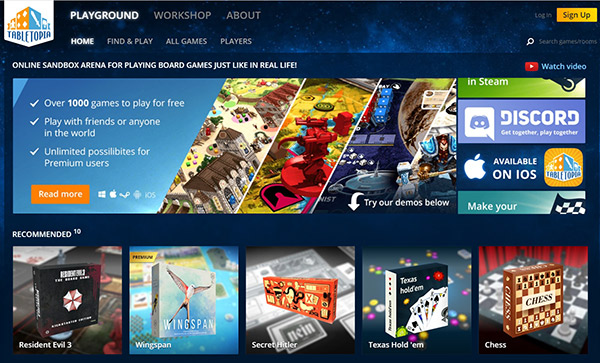At this point, I’m going to say something that everyone in 2020 knows: COVID-19 has changed our lives in substantial ways, primarily causing humans to shun physical or social contact with those outside their familial bubble. Maybe that’s not such a big change for some of us (looks furtively around the empty room)?
For an avid board gamer, this has meant that physical meet-ups with friends, enemies, and acquaintances for board gaming sessions has trickled to a halt, leaving much fewer opportunities for playing physical games, especially (for me), the heavier games I prefer. In response to this, many people have moved to gaming online. Sites like Yucata, Boiteajeux, and (my preference) Board Game Arena, which feature browser based implementations of board games with scripted rule implementations, have seen a massive surge in popularity*. Folks are trying out Tabletop Simulator and Tabletopia, which are physics simulators that are used to implement board games. With the wide variety of games on these platforms (often free or at a reduced cost) online board gaming has never been better.
Online board game site Tabletopia has a boatload of games to play
*Some other, more specialized sites exist. Here are two that I’m aware of:
-
18xx games: 18xx.games
-
Splotter games: Boardgamecore
While none of the implementations are the same as sitting across the table from another living, breathing person, they provide an excellent resource for tabletop gaming. One of the biggest benefits of online gaming is that I’m able to play with folks that I would normally never get to play with. I have played games with my brother-in-law who lives in another state. I’ve played games with people I’ve met through the Nights Around a Table Discord server, from exotic locales like the UK, Ontario, and… Minnesota?
Platform vs. Purpose
However, these implementations have shortcomings! Tabletop Simulator and Tabletopia may lack scripting (meaning you have to physically pick up and move pieces around, which is fiddly at best) and can really slow down play times. Sites like BGA may not have undo buttons, and can make it difficult to learn the game (mouse over alt text doesn’t work well on a phone, for example). When it comes to digital board gaming, I would submit to you, dear reader, that the best implementations are (with some exceptions) purpose-built applications.

Left: Scythe on Tabletop Simulator. Right: Scythe:Digital Edition on Steam.
In this series, I hope to review a number of board game apps, giving you the good, the bad, and whether or not I would recommend them. I will attempt to avoid reviewing the games themselves, as games are highly subjective and I don’t want to crap on your enjoyment of something. If you like the game, or think you might like the game, this should be an objective look at whether or not the digital app implementation is good.
What makes me qualified to write this, you may ask? Good question, thanks for asking. Absolutely nothing. I’m just a dude who likes board games. BUT, I’ve played a fairly large number of digital games, primarily on iOS devices, but also on PC. So, hopefully you find this helpful!
Read more articles from this series:

Dr. Benjamin McPheron
Contributor
Ben (or Dr. McPheron of DMExplains) is an associate professor of Electrical Engineering and a hobby Youtuber, making videos primarily for the purpose of engineering education, although he occasionally dabbles in music parodies. He is an avid board gamer, and enjoys playing a variety of games with a preference towards heavy economic games. His favorite games include Race for the Galaxy, Agricola, Brass: Birmingham, Pipeline and Vinhos Deluxe.








Trackbacks/Pingbacks